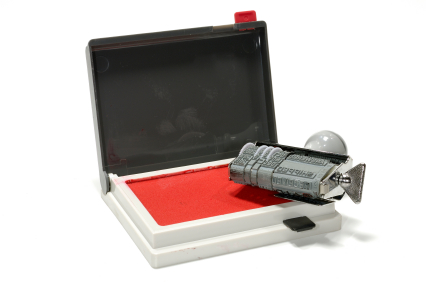
When I was younger I had a pink, heart-shaped stamp with my name printed in the middle. I used that stamp voraciously as a way to indicate ownership and as my imprimatur on letters and other things. Even before I could properly sign my name that stamp enabled me to indicate my approval; it allowed me to attest to that which aligned with my perspective (however naive that perspective was as a young child.) I treasured that stamp because it was a way for me to state a claim in little and small things alike.
Like most people, as I grew I had other ways of indicating my approval with things. We learn to articulate our positions, to make a case, and to contend for our perspective, not to mention we learn how to sign our names. What’s convicting though is how often we signal our approval without any purposeful forethought. Perhaps we keep silent when we know we shouldn’t, thereby giving indication that we condone the actions or words that have been said. Perhaps we laugh when we should reprove. Instead of a stamp with our name on it, our actions and words often serve as our imprimatur instead. Sometimes it seems that our approval is cheaply acquired as we freely give it to avoid conflict or contention.
Philippians 1:10 reminds us, however, that for the Christian, actions and words should meet certain criteria before our approval is granted them. As the verse states:
“so that you may approve what is excellent, and so be pure and blameless for the day of Christ,”
Our approval, then, should not be cavalierly bestowed, but should be granted to those things that are excellent in nature – not in terms of the world’s perspective, but from Heaven’s vantage point. We should be looking towards how eternity will valuate actions and words and align our approval with that which will be thought of as “excellent” in the age to come.
The preceding verse indicates how Paul desired that this perspective would be granted to the church in Philippi. He writes:
And it is my prayer that your love may abound more and more, with knowledge and all discernment, (Phil. 1:9)
In other words – the church at Philippi was to love in increasing measure, but they weren’t to do so blindly. Their love was to be coupled with “knowledge and all discernment” so that the things that they approved of, they things that they gave their imprimatur to, would mirror that which Christ would commend. Their standards for conduct were to be His standards; what they approved was to be the same things which would prompt Him to say “well done, good and faithful servant.”
It can be frightening to think of the things that we approve of, either by tacit consent or by silent affirmation. When we act in ways that seem to condone evil, or when we neglect to set ourselves apart from the evil that exists, we tarnish our witness and our representation of Christ. Instead, we need to be striving for purity and blamelessness so that what we approve is the same as that which Christ does. Our approval should not be squandered on lesser things, but only what is deemed excellent from Heaven’s perspective.